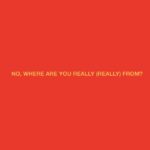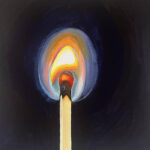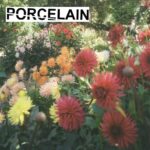Interview: Gulfer Really Feel Like Themselves
Posted: by admin
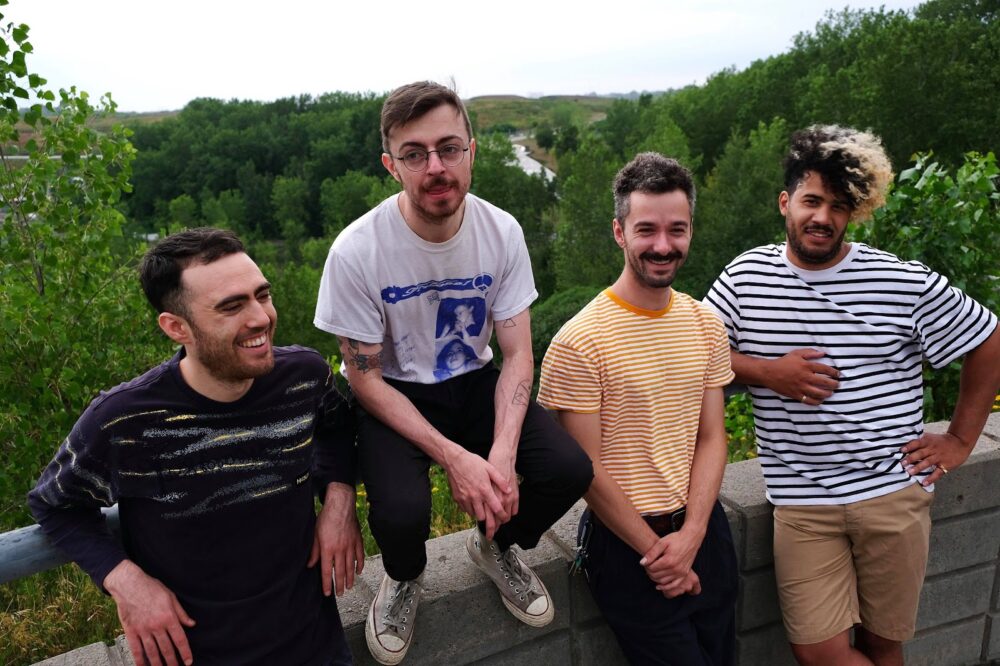
Gulfer’s third LP wasn’t supposed to be self-titled. “It was fully a last-ditch scenario,” David Mitchell (bass/vocals) told me over a video call early in October. “The title we had, we just couldn’t use. And we spent the next couple of weeks just desperately trying to think of a new title.” Listening to Gulfer, which came out October 16 on Topshelf and Royal Mountain, it’s hard to imagine the band having so much trouble coming to a consensus on what to call it. This is the band doing what they did best for almost all of the 2010s, melding together a melodic but tricky kind of math rock with the gripping wail of emo punk. But on their self-titled record, the band started to draw in other influences—the shimmering, distant production aesthetics of shoegaze and the bright electronics they dabbled with on their 2018 record Dog Bless.
“Nature Kids,” for instance, has a core that follows up nicely on the band’s penchant for writing songs that twist and turn in tightly coiled guitar riffs. But it wafts in on a gossamer bed of atmospheric sounds, Vincent Ford’s (vocals/guitar) vocals now all blurred out around the edges, weaving deeper into the knotted music as it suddenly bursts and retracts. Other songs, like the incredible “Heat Wave,” extend themselves beyond the expected end point for a Gulfer track, reaching into a second, uncharacteristic moment of quiet rumination. The updates are slight, but they go a long way—these songs sound incredibly fresh but also distinctly Gulfer.
This distinct sound is a result of a more measured, unified approach. “The process of recording was a lot more conscientious than what we’ve done in the past,” Joey Therriault (bass/vocals) said. “With this new album, I just felt a little more comfortable and a little more at ease expressing the diversity of influences that are reflective of what we listen to as fans of music.”
When the band set out to record Dog Bless, Gulfer had only recently fallen apart and reconfigured. “There were a few months when we weren’t sure if this band would continue because we didn’t have a second guitarist or a drummer,“ Mitchell said. After recruiting Therriault and Julien Daoust (drums), Dog Bless was assembled in a hurry.
Gulfer, on the other hand, benefits from a little more time together and a more collaborative approach. “It felt way more organic and natural,” Mitchell said. The resulting record is one the sharpest and most interesting records of its kind in years, with the makings of a classic in the little math rock/emo scene.
Few bands in that scene have lasted as long as this one has. The members of Gulfer recognize that they’re mostly on their own in terms of contemporaries. One of the few bands that they identify with in terms of sound and era is I Love Your Lifestyle, who also recently released a record that pushes the little microgenre in a different direction, albeit a shiner, more melodic one than Gulfer reached for. Indeed, Gulfer is a little bit stranded even in their own hometown—”we’re definitely a little bit of a sore thumb here in Montreal,” Therriault said.
Maybe Gulfer didn’t intend to self-title their record, but it makes complete sense. The band has succeeded for so long just by doing their own thing—Gulfer is at once a culmination of their history and a renewed push toward something new. “This is the first time when we’re really satisfied with what this sounds like,” Therriault said. “This really feels like us.” It’s a blessing that, when backed into a corner, Gulfer just ended up becoming themselves.
I talked to Therriault and Mitchell about the trials of being a Canadian band working in different countries, their new record, and their future. You can read that below, and be sure to listen to Gulfer, which is out right now on Topshelf and Royal Mountain.
So you have a new self-titled record coming out this month. Can you walk me through the process of how you wrote and recorded it?
Joey Therriault: It was written over the course of a long time. Some of these songs we were writing at the very end of when we were recording Dog Bless, so that was like two or maybe even three years ago. We practically finished recording the self-titled this time last year. We spent the last year mixing it and talking to labels and organizing the timeline and all of that. The process was a little bit different this time because we split the writing. In terms of the bare bones songwriting between myself and Vincent, I did five songs and he did five songs. Then we would bring them to the band and we’d build the song together.
David Mitchell: With the last record, half of the band had quit and we thought we were kind of done. I was away for three months on tour with another band and Gulfer just wasn’t doing very much. But then we got an email from Big Scary Monsters seeing if we wanted to work with them. And then we got an offer to play a show with PUP and Jeff Rosenstock, the PUP The Dream Is Over record release show in Toronto. I was away on this tour and me and Vince were like, we have to do these things, so let’s find a new half of a band. Dog Bless was written in a rush. There was no process, we just decided to build these songs and record them as quickly as we could. For the self-titled, we were already a band and we had already made a record—there wasn’t this sudden rushed impetus to do something. It felt way more organic and natural and not just circumstantial.
Joey: The process of recording was a lot more conscientious than what we’ve done in the past. In particular, Vincent had a lot of ideas —he had all these production things that he had in mind going into writing the record, which allowed us to add some more textures and to make it a little bit less of a straightforward punk album.
David: This is probably the first record where influences outside of math rock and emo have been fully realized and integrated. I think Joey and Vince were having a big moment with indie rock and slowcore and shoegaze as listeners, and I think this is the first record of ours where those influences have materialized in their fully realized potential.
So half the band left before Dog Bless?
David: This was the end of 2015. There were a few months when we weren’t sure if this band would continue because we didn’t have a second guitarist or a drummer. If those two opportunities from BSN and PUP hadn’t materialized, I don’t know what would have happened. It definitely gave us a very short period of time to recruit Joey and Julien. Vince taught them all the songs while I was away and then I came home and three weeks later we played that PUP show. It was kind of crazy. But we pulled it off, and basically right after that we started building Dog Bless. It wasn’t nearly as collaborative or organic an album-building process as this one was.
Joey: What characterized that record in contrast to the record that we’re putting out now is—myself and Julien, we had just joined. For me, one of the things going on in my mind was always like, “how do I write a part that fits within the context of what this band already is?” I’m in this band for just a short period of time trying to create something that’s representative of what the style is. With this new album, I just felt a little more comfortable and a little more at ease expressing the diversity of influences that are reflective of what we listen to as fans of music.
;
Dog Bless had those instrumental interludes that were way different than the rest of the record. With Gulfer, you continue with those interludes but it’s a little more seamless—some of those other sounds spill over into the other songs. Was that an intentional move?
Joey: It was very intentional. The one that Vince did with the Bob Dylan sample—he did that completely unprompted. I had written these two songs in E major, “Forget” and “Heat Wave.” I had sent them to him and we had worked on them a little bit and he just wrote this little thing to tie them in together. Just like demos from our phone from a band practice one day. I thought it sounded really cool. Within a few weeks of that, I saw this David Bowie interview where he’s in the back of a car in the desert and he’s talking about this wax museum where everything’s melting because it’s in the desert. It’s pretty surreal. And so I wrote something that was in the key of two songs that we were thinking of tying together.
David: The last time, it wasn’t about tying tracks together at all. We just sat down with Will [Osiecki], who is my best friend and who does a lot of stuff at Topshelf—we have an electronic project together. The four of us and Will sat down at our studio and wrote this one loop. We had no intention of it fitting on the record in any kind of way. It was just sort of intended to be a palette-cleansing thing after every three songs. With this record, it was the complete opposite. It was completely in house, with the keys in mind and transitions between songs in mind. I’d like to do something on the next record that’s a mix of both approaches where we integrate more Ableton-y high-end audio stuff with the lo-fi, garageband-y sample thing. Just make a big electronic record out of it.
You mentioned that you started writing the self-titled as you were finishing Dog Bless. Have you already started the process of working on new songs?
Joey: Yeah, a lot.
David: Big time. And it’s cool because we’re actually formally doing pre-production for the first time. We’re actually doing some pretty decent-sounding recordings, not just practice space demos but individually tracking every instrument. We’re doing it all on our own, but that’s what’s been occupying our time creatively, making these little demos. Which is great because we’re not touring and we’re not playing shows. For me personally, it’s a great practical way to be analytical about the parts I’m writing. It lets me break down certain rhythmic things that maybe I don’t catch in band practice. Anytime we’ve recorded anything before now, I always listen to it after and think that if I had better sounding demos I maybe would have approached the songs differently. It’s also pretty exciting that we do have a lot of a record written and maybe this will be the first time that we ever ditch songs. Maybe we’ll write more than a record’s worth and choose the best ones. I’m really excited about that.
Joey: It just gives us so many more options that I’m really excited about from a creative standpoint. Also, I’m just a believer in doing it every day and just always always, always writing. If you continue to write, you’ll have more good stuff. We’ve also been doing a lot of overdubs. On a track, normally there’d be like one guitar for me and one guitar for Vincent. Now we’re doing like three or four or five little layers, little subtle things that we can approach going into the studio and show the engineer some of ideas that we have, some things that we’d like to see materialized. It makes us a lot more prepared.
What’s the COVID situation like where you are? Have you been able to see each other?
Joey: It’s just changed recently. Our city, Montreal, just became what’s called a red zone. So the second wave has begun, so to speak. So we haven’t had a band practice since that has been the case. It’s been like two weeks. Prior to that, we were meeting up during the summer, when things calmed down a little bit, we were meeting up probably once a week and practicing. Now that we’re doing this pre-production, we’re able to work independently of each other.
David: We got really lucky, timing wise. We didn’t meet for months between March and May. But there wasn’t a tremendous amount of in-person stuff that necessarily needed to be done. Once it become warm outside and a lot more lowkey about COVID for a few minutes, that’s when we took press photos that we needed to take, that’s when we shot what will be a remote Audiotree thing that we’ll be releasing, and that’s when we shot the video for “Nature Kids.” And that’s when we wrote or built the six demos that we have for this new record. Now that that’s all kind of wrapped up and things are getting crazy again, it would be nice to meet up in person, but we do have a lot of work to do, independent work, on these demos.
You’re based in Montreal but you’ve done a lot of touring and business in a number of different places. What has the experience been for you navigating your career across countries?
David: It’s a lot of pluses and minuses. For me, the most frustrating thing over the course of this band’s history is how difficult it is to get into the states, visa-wise. We’re less than an hour away from New York state and pretty close to Boston—in a better world, it would just be a day trip to go play a show in Boston and come back. We’ve played Toronto a million times, just because it’s a place that’s close. But we’ve only ever played Boston twice. We haven’t toured America in any capacity in five years. We’ve only ever toured the states twice and it was always a huge nightmare as far as getting in. It’s frustrating how close we are and how inaccessible it is. It’s almost taunting at times. But we also, up until pretty recently, no one in the band drove and we don’t have a van. We’re not in any capacity a traditional touring band. But I think we’ve taken that hindrance, that inability to play in the states, and turned it into maybe playing in Europe more than a lot of North American bands would or, you know, going to Japan. Just because plane tickets cost as much as a visa does.
Really?
Joey: Yeah, and they’re even more expensive now.
David: Yeah, they just changed the laws. So for us, it was just like, well, we don’t have a van in the first place, so we can go to the states and we’ll have to rent a van or something anyway. Or we can fly out to Europe or fly out to Japan and have the same issues. It’s gonna cost us four grand to get a visa or it’s gonna cost us four grand to get plane tickets. The fact that we didn’t get to play in Chicago or New York or Philly or Boston on Dog Bless at all, it sucks, it’s stupid. But, at the same, we’re not a touring band, I think a lot of the people in our band don’t really love touring in the first place. We’ve done it our own way and maybe we’ve experienced certain things that other comparable bands haven’t and maybe we’ve missed out on certain things that other comparable bands from the states sort of take for granted—we’ve never been to the west coast but we’ve been to Europe three times. I think that’s part in parcel of being a Canadian band. Even moreso, being a Quebecois band. So many people from this province don’t even leave the province. It’s a very insular place. So I’m proud of the little bits and pieces we’ve done.
Joey: One thing that I feel like we miss out on—there are just so many great American bands that I’d love to play with. I think if we were to play in the US, we would just get to play with so many more bands that I like. Maybe one day, but at this point in time, we’re not even thinking about touring.
David: That’s a good point. Maybe if it was easier to get down to New England and Philly and stuff, then maybe we’d have better friendships and relationships with bands, you know? But I also think it’s because we’re old. We had good friendships and relationships with our generational contemporaries, but I think there’s a whole new generation of bands out that I’d love to be friends with but I don’t even know if we’re relevant to them. Like the Origami Angels and the Charmers and all those bands.
Joey: Anytime we get to tour is amazing, but I think the focus for all of us, what excites us and what we want to do with Gulfer is just write. That’s the exciting part and we get to focus on that, so we’re all happy.
You mentioned that a lot of the bands you considered your contemporaries broke up years ago. I’ve noticed that not a lot of bands who make music like yours have taken it quite this far or gone on for quite this long. In your mind, who are your contemporaries that are still going?
David: It just depends on how broad your definition of it is. Do we align with this generation of Counter Intuitive like “weed emo” stuff? Is that our scene? I think it is and it isn’t. If it is, then, yeah, we have like a million contemporaries who are killing it, who might just be a couple of years younger than us and don’t sound exactly like we do. I guess it just fundamentally depends on how broad a definition you want to give our sound compared to maybe what’s popping off with the kids these days. If you are to look at it from a very 2013 perspective, I don’t think we have too many contemporaries. I want to say like I Love Your Lifestyle, but we don’t sound anymore like them than we do like Prince Daddy. They’re both in their own lane sonically. I think we just have a closer relationship to I Love Your Lifestyle because they’re our age and we met them in 2014 and did a lot of stuff with them in 2016. This is maybe a weird thing to say, but I also think our new record sounds pretty uniquely like us in a lot of ways, in terms of all these new influences that we’re bringing in.
With their new music, I Love Your Lifestyle is also sort of taking a similar template and going in a different direction with it. You had similar starting points but you’re unique in that you keep going with it beyond its logical end.
David: Right. So that’s definitely my number one touchstone in terms of who our contemporaries are right now. They check off a lot of boxes generationally and with their approach, and we have a really good relationship with them. That’s my best answer—one other band. Also not American. Also in their own lane doing their own thing.
Do you feel like you’re part of a scene in Montreal?
Joey: We’re definitely a little bit of a sore thumb here in Montreal.
David: We do not fit in, in any capacity. Any scene that we belong to in the city is because I put on shows [laughs]. I put us on shows with other touring bands that sound like us. 2014 was kind of the height of Montreal emo, there was a good scene for a few months.
Joey: There are not a lot of bands here that sound like us. There’s another factor, and it’s maybe hard to flesh out how important this is because this is the only place I’ve lived so it’s a little hard to make a comparison, but because we live in a French city, there’s a really substantial part of the city that might for one reason or another gravitate a little bit less toward the style of all of these American bands.
David: A lot of people here only listen to French Quebec music.
Joey: Despite the fact that our city is pretty big, basically the whole scene that we have is very attributable to shows that David has booked at his old house. Through David not living there and some bands breaking up, we’re one of the only bands in our city that sounds like us at the moment.
David: I think a really important factor to note about our city specifically is that, compared to basically the rest of North America, nothing is 21 plus here. It’s all a very unenforced 18 plus. So there’s never an issue of all ages or people not being able to get into shows. Whereas other cities might have a big all ages culture, that just doesn’t exist here because there’s no need for it to. And so I think that coupled with the fact that there’s this big French scene…in general the emphasis on international music or American music is way less than even in Toronto. Not to self-aggrandize, I don’t know, if I wasn’t putting on those shows, no one in the emo revival scene or the math rock scene would probably ever have come through, at least in a DIY capacity. And no one would have noticed! Like, oh well, Algernon never played Montreal. But no one cared, so it doesn’t matter! [laughs] But we’ve made the best of it and there are a lot of pluses to being a band in this city—it is a really good music scene in general if you’re an indie rock band and there are a lot of really good venues to play, a lot of cool places to record and cool places to practice. There are a lot of pluses. But the kind of music we play never really had a moment.
You mentioned that you feel like you’ve defined your own distinct sound now. Is that the thinking behind this record being self-titled?
Joey: It ended up being kind of like that—but the self-titled was, we had some other ideas that we wanted to do and then it didn’t really work out and we were trying to find something that we were all happy with. The self-titled idea, at first it was like, well we don’t have a better idea, so let’s do this. But then we kind of thought about it and we were like, well this is the first time when we’re really satisfied with what this sounds like and this really feels like us, and so in that sense we actually do think that it fits really well. But that’s a bit retroactive. There were some very desperate group chats where we were all brainstorming ideas.
David: We were trying to come up with both the title and the album artwork in the same conversation. And it was the beginning of quarantine and life was already super weird and I’m just sitting in bed having the most punishing group chat. But I’m really happy about the self-titled thing. But now there’s this hilarious pressure where we’re like, what are we going to name the next record? But we’ll cross that bridge.
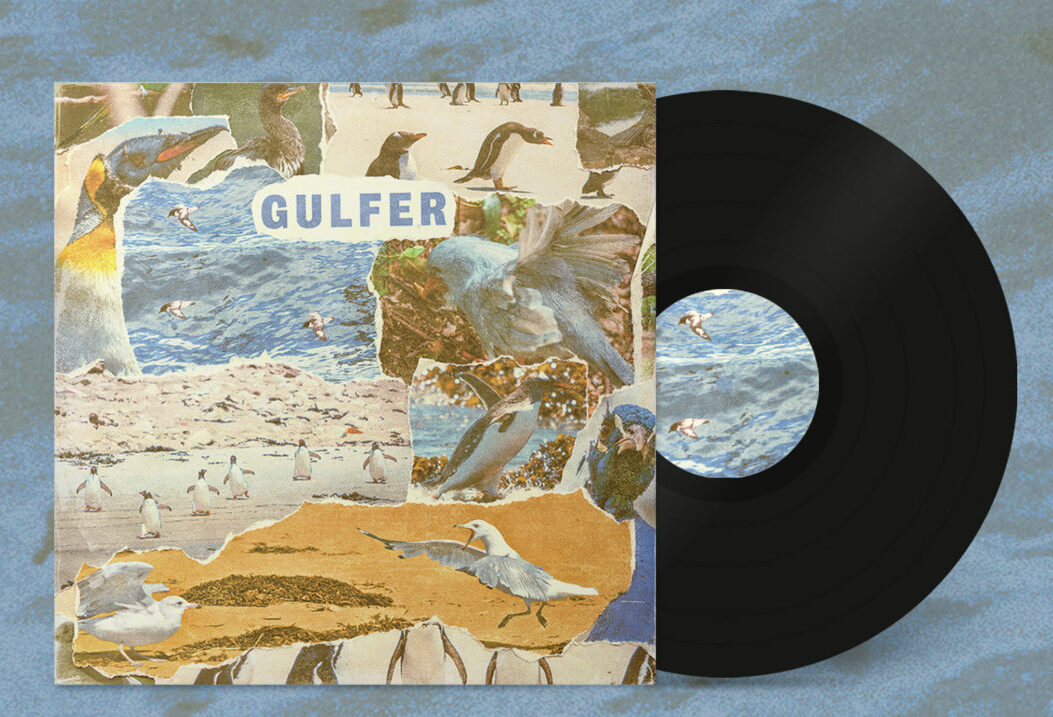
Gulfer is out now on Topshelf and Royal Mountain.
_
Jordan Walsh | @jordalsh
The Alternative is ad-free and 100% supported by our readers. If you’d like to help us produce more content and promote more great new music, please consider donating to our Patreon page, which also allows you to receive sweet perks like free albums and The Alternative merch.


